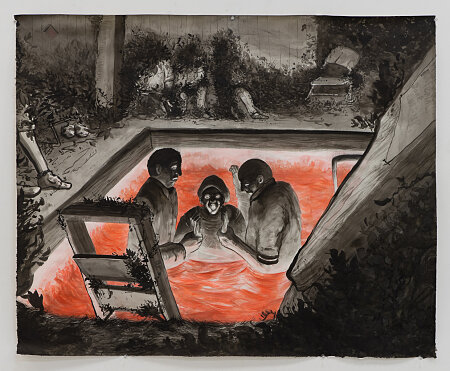
Before Paris
That evening, they dined at Bistrot du Nil at a table by the window. The man cut into his steak, the woman into her coeurs de romaine grillés. As they shared a bottle of pinot noir, the woman engaged her husband in small talk—about their cruise on the Seine, their stroll along La rue d’Arcole. She spoke English and continued to speak English throughout the meal—through the French endive, the glace á la vanille, the arlettes (which turned out to be cookies).
As the waiter uncorked and poured a bottle of Chenin Blanc, a faint rapping came at the window. A gentleman, framed by the waning sunlight, stood on the walkway outside. At first, the man at the table didn’t recognize him, but then his black scarf slipped from the collar of his herringbone jacket. The gentleman outside spread his fingers and traced them slowly across the glass. His eyes widened, and his mouth exaggerated words that the man inside could not decipher.
The man turned to his wife, who had already recognized the gentleman, her eyes and mouth mimicking his. She was mouthing something in French, only the wisp of the word audible from across the table, the sound breaking the spell of the mime on the other side of the glass. Chanson? Charmant? Concert? The gentleman waved and departed.
As the man returned to his Chenin Blanc, the woman returned to English. It struck him that, while his wife was making a valiant effort to speak his language, the sound and rhythm was suddenly beyond her grasp. The expression in her eyes and her lips had overwhelmed her words, and her husband sensed a sadness beneath her gestures. She seemed to be searching for her own language, one both clear and cryptic, uncommon and evocative. When she commented on their latest bottle of wine, her husband discovered his own sadness and was drawn back to the street—the sidewalk rounding the bistro, the bicycles along the path, the lingering sliver of sun.
When they returned to their hotel, they made love. He was relaxed, a consequence, perhaps, of two bottles of wine, but there was also his wife, who was mostly silent during moments of intimacy, whether in Paris or Omaha, so he had no need to sort through her multilinguistic phrases and cultural references. Afterward, when she retreated to the bathroom, he tried forming his own images drawn from his online immersion in Parisian life—the café, the river, even impressions of Cézanne, but they were difficult to envision. As he fluffed his pillow and closed his eyes, colors and shapes began to emerge through the darkness—blushes and browns and blondes; hats and berets and scarves; cows and lambs and dogs—and he began, in his elementary French, to count the shapes he was familiar with—apples, horses, young women—un jeune femme, deux jeunes femmes, trois jeunes femmes. At the periphery of the images stood the gentleman in the black scarf—his lively face, his wide mouth and eyes, his fingertips delicately tracing and tapping the window. The man breathed deeply and continued his count. Quatre jeunes femmes, cinq jeunes femmes, six jeunes femmes. Deep into his counting, he fell asleep.
In the morning, when he woke and found his wife’s side of the bed empty, he assumed that she must have decided to begin breakfast without him. As he dressed, he saw a note near the base of the lamp. It was in French, and although he had no idea what it said, he immediately recognized the elegance of his wife’s handwriting—the scrolls, the fades, the details of her latest effort to submerge her husband in French culture.
If only he could recite the letter to her, he thought. How impressed she’d be by his conquest of the language! He took the letter with him on his way to the café and stopped at the front desk. He handed the letter to the clerk.
“In Anglais?” he asked the clerk, enunciating each word clearly. “Anglais,” he repeated.
The clerk looked over the note then signaled to the concierge, who smiled as he took the letter.
“Anglais,” the clerk whispered.
“Let me see,” the concierge said to the man as he glanced over the wife’s handwriting. “Cher Jean,” he began.
He looked up at the man.
“Jean?” he asked, and the man nodded.
